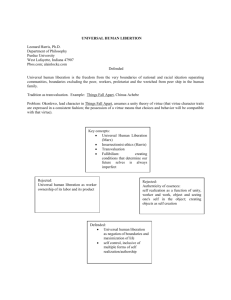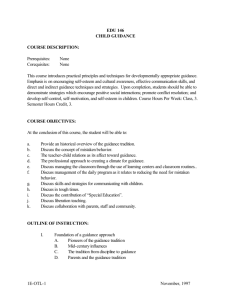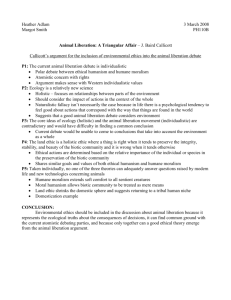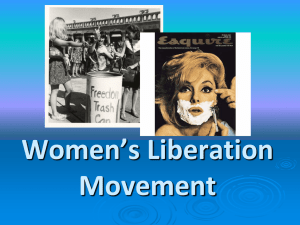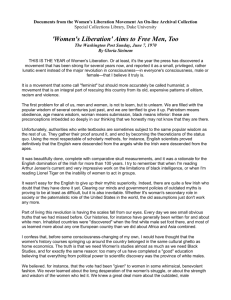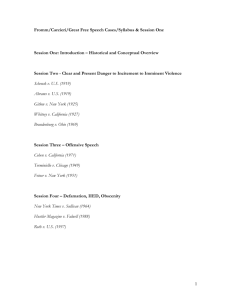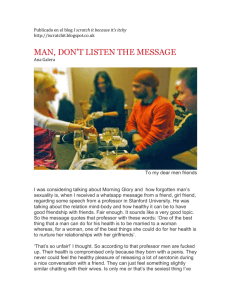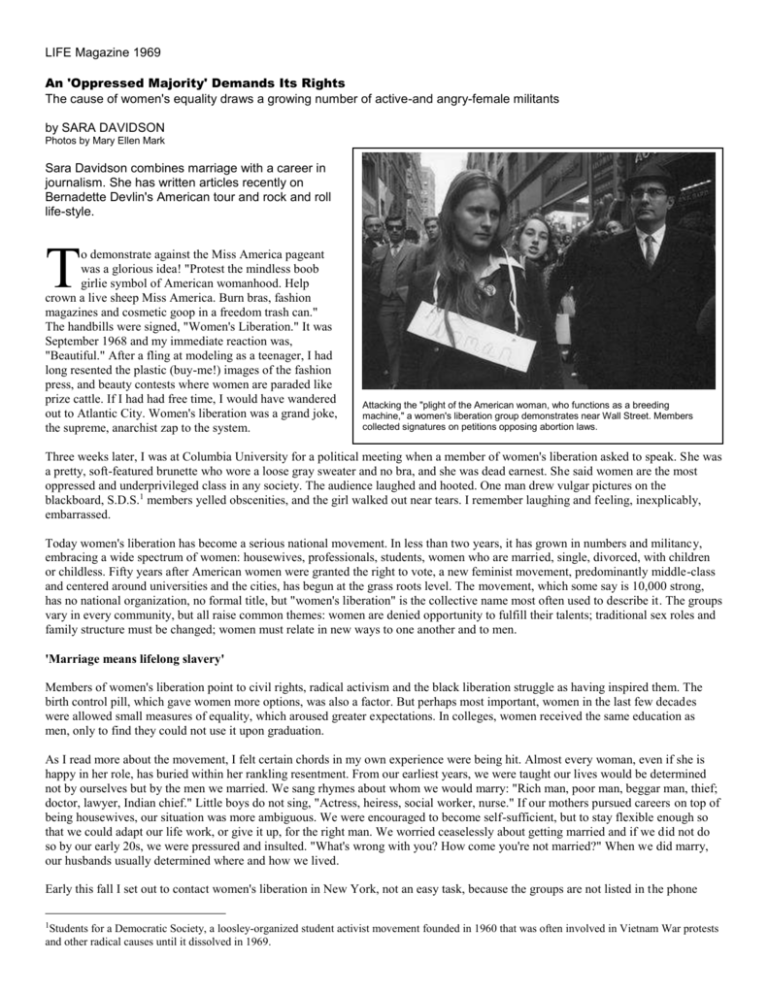
LIFE Magazine 1969
An 'Oppressed Majority' Demands Its Rights
The cause of women's equality draws a growing number of active-and angry-female militants
by SARA DAVIDSON
Photos by Mary Ellen Mark
Sara Davidson combines marriage with a career in
journalism. She has written articles recently on
Bernadette Devlin's American tour and rock and roll
life-style.
T
o demonstrate against the Miss America pageant
was a glorious idea! "Protest the mindless boob
girlie symbol of American womanhood. Help
crown a live sheep Miss America. Burn bras, fashion
magazines and cosmetic goop in a freedom trash can."
The handbills were signed, "Women's Liberation." It was
September 1968 and my immediate reaction was,
"Beautiful." After a fling at modeling as a teenager, I had
long resented the plastic (buy-me!) images of the fashion
press, and beauty contests where women are paraded like
prize cattle. If I had had free time, I would have wandered
out to Atlantic City. Women's liberation was a grand joke,
the supreme, anarchist zap to the system.
Attacking the "plight of the American woman, who functions as a breeding
machine," a women's liberation group demonstrates near Wall Street. Members
collected signatures on petitions opposing abortion laws.
Three weeks later, I was at Columbia University for a political meeting when a member of women's liberation asked to speak. She was
a pretty, soft-featured brunette who wore a loose gray sweater and no bra, and she was dead earnest. She said women are the most
oppressed and underprivileged class in any society. The audience laughed and hooted. One man drew vulgar pictures on the
blackboard, S.D.S.1 members yelled obscenities, and the girl walked out near tears. I remember laughing and feeling, inexplicably,
embarrassed.
Today women's liberation has become a serious national movement. In less than two years, it has grown in numbers and militancy,
embracing a wide spectrum of women: housewives, professionals, students, women who are married, single, divorced, with children
or childless. Fifty years after American women were granted the right to vote, a new feminist movement, predominantly middle-class
and centered around universities and the cities, has begun at the grass roots level. The movement, which some say is 10,000 strong,
has no national organization, no formal title, but "women's liberation" is the collective name most often used to describe it. The groups
vary in every community, but all raise common themes: women are denied opportunity to fulfill their talents; traditional sex roles and
family structure must be changed; women must relate in new ways to one another and to men.
'Marriage means lifelong slavery'
Members of women's liberation point to civil rights, radical activism and the black liberation struggle as having inspired them. The
birth control pill, which gave women more options, was also a factor. But perhaps most important, women in the last few decades
were allowed small measures of equality, which aroused greater expectations. In colleges, women received the same education as
men, only to find they could not use it upon graduation.
As I read more about the movement, I felt certain chords in my own experience were being hit. Almost every woman, even if she is
happy in her role, has buried within her rankling resentment. From our earliest years, we were taught our lives would be determined
not by ourselves but by the men we married. We sang rhymes about whom we would marry: "Rich man, poor man, beggar man, thief;
doctor, lawyer, Indian chief." Little boys do not sing, "Actress, heiress, social worker, nurse." If our mothers pursued careers on top of
being housewives, our situation was more ambiguous. We were encouraged to become self-sufficient, but to stay flexible enough so
that we could adapt our life work, or give it up, for the right man. We worried ceaselessly about getting married and if we did not do
so by our early 20s, we were pressured and insulted. "What's wrong with you? How come you're not married?" When we did marry,
our husbands usually determined where and how we lived.
Early this fall I set out to contact women's liberation in New York, not an easy task, because the groups are not listed in the phone
1
Students for a Democratic Society, a loosley-organized student activist movement founded in 1960 that was often involved in Vietnam War protests
and other radical causes until it dissolved in 1969.
book. You have to find someone who knows the number of someone, or learn about a demonstration and attend it. The first group I
was able to locate was the Feminists, who appeared one afternoon at the Marriage License Bureau to protest the marriage contract. TiGrace Atkinson, a tall blonde from Louisiana who is a doctoral candidate in philosophy and a longtime radical feminist, told the
women reporters, who stifled smiles, that husbands should pay wives for all labor in the house. She grimaced. "Tony Bennett sings
these songs of propaganda: get married and everything will be all right. Marriage means rape and lifelong slavery." A reporter asked,
"What about pregnancy?" Ti-Grace (her name is Cajun for petite, or little, Grace) constricted her face, as if suffering. "It's very
painful. It's so immature to grow babies in people's bodies. If we had test-tube babies, there would be less chance of deformed
fetuses."
Five of the Feminists, who ranged from 25 to 30, met
with me later in the one-room, one-windowed apartment
of Pamela Kearon in a Greenwich Village tenement.
They said they joined forces a year ago to annihilate sex
roles. The group is highly regimented; all tasks are
assigned by lot, members cannot miss meetings or
disagree with the Feminists' line, and no more than a
third of the group can be married or living with a man.
"The purpose of our quota is to show that we mean what
we say," Ti-Grace said. "We reject marriage both in
theory and in practice." I began to feel self-conscious
about the wedding ring on my finger. "Aren't there any
positive differences between the sexes?" I asked. Linda
Feldman, a heavy-set office worker, said, "I don't know
if there are any differences between men and women.
What differences could there be except genitals?" I said
men are physically stronger. She said, "I don't think that
would be true if women exercised more strenuously
while growing up."
Ti-Grace Atkinson, left, with members of the Feminists, demonstrates at
Manhattan's Marriage License Bureau. "Sex is overrated," she says. "If someday
we have to choose between sex and freedom, there's no question I'd take freedom."
On to love. Ti-Grace said, "Love has to be destroyed. It's an illusion that people care for each other. Friendship is reciprocal, love
isn't." And sex? "In the good society, we can't tell what will happen to sexual attraction. It may be that sex is a neurotic manifestation
of oppression. It's like a mass psychosis."
"The more I understand what's going on with men," Ti-Grace said, "the less I miss male companionship and sex. Men brag about
domination, conquest, trickery, exploitation. It gets so I can't even respond. Male chauvinism comes out in waves-every gesture, every
word."
After three hours on this subject, I was depressed. What had led these women to the point where they could coldly dismiss feeling and
touching, sex and love? Some of them are quite beautiful, which creates political contradictions. Women's liberation rejects the glossy
magazines' vision of the liberated girl, who wears see-through clothes, smokes Virginia Slims and gives free love. The feminists say
this fake liberated girl is a sex object, a bigger and better prostitute, not a human being. Women's liberation members avoid makeup,
fancy hair styles and seductive clothes. If they go without bras, it is to be natural, not erotic. A girl in Chicago described the
progression of giving up short skirts, then makeup, and recently, shaving her legs. "I still look at my legs and think, oh my God, I
cannot go through with this. I'll die for the revolution, but don't ask me not to shave my legs! I have to keep reminding myself that
there's nothing wrong with body hair, and no reason for one sex to scrape a razor over their legs."
Even the most radical feminists, however, retain many female character traits: soft-spokenness; talkiness (interviews and phone calls
are difficult to terminate); and a proclivity for handwork. There was hardly a meeting I attended where someone was not knitting.
While they condemn seductiveness, many want to look attractive. Pam Kearon of the Feminists said, "People like to look nice for
other people. It's a statement of respect. It's just not true that we want to look like ugly freaks."
Some of the Feminists were active in the National Organization for Women (NOW), which they left in 1968 because they felt it was
not radical enough. NOW was founded by Betty Friedan, whose book, The Feminine Mystique, was the signal flare of the new
feminism in 1963. NOW members are, for the most part, professional women who want to end sex discrimination in hiring,
promotions and salaries; repeal abortion laws; establish comprehensive child care; and place women in policy-making posts. NOW
has been called "the NAACP of the women's movement," but in the past year it has moved left, influenced by the younger activists.
I began to encounter hostility and fear
In an apartment on the Lower East Side, Redstockings, a group which takes its name from "Blue Stockings," a term used in the past
for intellectual women, meets each Sunday. A poster on the wall reads: "Speak pains to recall pains -the Chinese Revolution. Tell it
like it is-the black revolution. Bitch, sisters, bitch!-the final revolution." The group employs consciousness-raising, or the bitch
session, to gain political insights from shared feelings. More than 30 young
women sit crowded on the floor of the small, stuffy room for five to six hours. A
question is posed, such as, "Did you choose to stay single or marry?" Each girl
relates specific incidents in her life, and at the end, the "testimony" is analyzed.
They find that problems they thought were their own private sorrows are shared by
everyone in the group. "If all women share the same problem, how can it be
personal? Women's pain is not personal, it's political."
In the past month Redstockings has been considering, "How do you feel about
sexual commitment and fidelity? Have you ever wanted to have more than one sex
relationship at a time?" Several said their boyfriends or husbands felt women
should be faithful while men could be free. One said she'd mind less if her
husband had affairs with people he didn't care about than if he were emotionally
involved. Another disagreed: "Since I've been in women's liberation, I object to
my husband using other women like that."
One girl said, "1 would like to be able to be tolerant and understanding if I learned
my husband was having an affair, but I don't think I would be." Another said, "We
say we'd like to be that way, but no one in this room would not feel hurt and
angry. Maybe infidelity is a bad thing, and our feelings are right." The point struck
me. Why should women not listen to their feelings; why should they feel guilty
about them? The group was split on the desire for sexual commitment. Some felt it
was imprisonment; others saw it as true freedom. At length they hit on the idea
that women might write up their own marriage contract that would spell out
commitment to fidelity or lack of it, priorities in life, and what division of labor
there would be in the home.
Redstockings meet for a "consciousness-raising"
session. "Women aren't in a position to make demands
now," one says. "We have to build a mass movement
first."
Members of Redstockings have spent much time analyzing why women feel
competitive and suspicious of one another, why so many like to say, "I'm a man's
woman," and place little value on female friendships. Those who succeed in
careers often feel they are special and look down on other women. Redstockings members say they identify with all women, and will
always take the woman's side. "In fighting for our liberation. .. we will not ask what is 'revolutionary' or 'reformist,' only what is good
for women."
About the time of the Redstockings meeting, I began to encounter hostility, fear
and a distressing contrariness in some of the women's groups. I called a member
of WITCH (Women's International Terrorist Conspiracy from Hell), a feminist
revolutionary group which, in its manifesto, sees witches as the first guerrilla
fighters against women's oppression: "Witches have always been women who
dared to be groovy, courageous, aggressive, intelligent, nonconformist, sexually
liberated, revolutionary." We spoke for an hour with what I felt was warmth and
rapport, and arranged to meet the next week. When I called later to set the time,
the woman hung up. I thought it was a mistake; I called back, and she said, "I've
decided I don't want to be used as an object by LIFE magazine." In the
background, a woman was screaming, "Don't apologize, just hang up."
Members of another group said they would vote at their meeting on whether to
talk with me. I was informed the decision had been affirmative. When I appeared
at the appointed hour, one of the women said she had changed her mind. "We've
been ridiculed by so many journalists. I don't think we should cooperate." The
group flipped over like a row of cards.
Robin Morgan of WITCH holds her 5-month-old son,
Blake. "Women shouldn't be afraid to be assertive," she
says. "And men shouldn't be afraid to be dependent."
In Boston, a girl active in a new group, Bread and Roses, invited me to stay at
her home. I declined, but asked to meet her. When I arrived, she said nervously
that a mistake had been made. She had spoken with others, who urged her not to
talk to me. I made further calls. Several people cursed and hung up. One girl said
she was torn between wanting to communicate about women's liberation and fear
of the American public's reaction. "We've been attacked as lesbians, or sick,
frustrated bitches." Others ranted at me as a member of the "corrupt, bourgeois
press," asked for money, and insisted they be allowed to censor anything I would
write.
Women are learning to express outrage
These experiences unnerved me, despite reminders that I
should not take it personally and an understanding of what
lay behind the fear and hostility. The negative reactions
toward me expressed a great deal of what women's
liberation is about: women's long-suppressed anger at
being used; women's sense of vulnerability and
defenselessness; women's suspicion and mistrust of other
women; women's insecurity, lack of confidence in their
judgments, the "secret fear," as one girl put it, "that maybe
we are inferior."
I had dinner with Diana Gerrity, a staff editor at the
Atlantic, who sympathized with my frustration. She said
people in women's liberation are just getting in touch with
the anger pent up inside them. "It takes a long time for any
"Every woman should get what she needs out of women's liberation," says Diana
Gerrity, a member of two feminist groups. "It may just be the courage to speak out."
girl to realize she can register her outrage." Diana, tall and
willowy, with long chestnut hair, was a fashion model
while doing graduate work at the University of Chicago. She is 25, has been married two years, and joined a liberation group last May.
"We've gotten to know each other very well. I don't think I ever trusted women before or really thought they were valuable people to
be with. Friendships were based on competing for men."
As Diana spoke she would interrupt herself and say, "I don't know if I'm making sense." There is not a woman I know who doesn't
feel, at some points, that she is rambling, not being rational. This must stem from expectations that women will be imprecise and fuzzy
in their logic. In universities, a compliment paid to bright women is, "You think like a man." Women who are successful in
professions come to think they have male attributes. A girl who was telling me about the difficulties of her job made an interesting
slip: "I'm harassed by all the other men."
Diana is studying Tae Kwon Do, the Korean form of karate, two nights a week. "I've always felt great fear whenever I had to go out
alone. Several friends of mine have been raped. Karate is as much psychological as it is physical training. It gives you the confidence
to be able to judge a situation, or maybe fight your way out, instead of just collapsing."
The karate class is taught by Jayne West, a member of
Boston Female Liberation, formerly called Cell 16.
Female Liberation is a tight-knit, fiercely committed
and clannish group which includes Abby Rockefeller,
daughter of David Rockefeller, chairman of the Chase
Manhattan Bank, and Roxanne Dunbar, who grew up
on a poor white farm in the South and has been writing
and lecturing on women's liberation for more than six
years.
There were 12 women in the class, three of them teenagers, and one 7-year-old who said she wanted to be
able to beat up the 16-year-old bully on her block.
Wearing coarse white uniforms, the women worked in
precise, military rows, punching, jabbing and kicking,
biting their lips and yelling "Kee-up!" Jayne West, a
blue belt, who wears a headband Indian style over her
long dark hair, rammed the floor with a board as she
Two members of Boston Female Liberation, Jayne West and Dana Densmore,
called out instructions. She kicked at the girls' legs and
practice a form of karate called Tae Kwon Do. "Most women are afraid of physical
shoved them from behind. "You've got to be very
conflict because they've been brought up as 'women,"' says Miss Densmore.
steady. Your punch has to be accurate. You want to hit
the person's solar plexus." I was watching from the back of the room when suddenly Jayne said, "Bricks!" The women wheeled and
stampeded toward me. My blood froze. Bricks? I found I was sitting next to a pile of bricks; each woman grabbed one, tore back to
line and began pounding it with her fists.
In their journal, No More Fun and Games, Female Liberation members urge women to leave their husbands and children and to avoid
pregnancy. Women should dress plainly, chop their hair short, and begin to "reclaim themselves" by dropping their husbands' or
fathers' names. They should live alone and abstain from sexual relationships.
Women's liberation has flowered in Boston to the point where it is impossible to attend a social gathering without hearing the subject
discussed. There are probably more than 1,000 women in the area engaged in feminist study groups, theater, groups of secretaries and
clerical workers, groups to legalize abortion, child care groups, encounter groups and women's communes.
A longtime friend of mine, Jane Harriman, joined a women's liberation group last May, and we stayed up through the night talking
about the movement. Jane is 29, an expressive, blue-eyed, affection-giving
woman who likes to play sad sack and be humorous at her own expense. She is
not married and supports herself and her 2-year-old son by working as a writer
for a social research firm. Members of her group, which meets once a week, have
been examining their personal lives to see where options were narrowed,
restrictions imposed because of sex. When Jane was 14, she decided she wanted
to be a doctor. ”I began working in a hospital and studied science like mad.
Gradually I got the idea I should be a nurse instead. My father told me I was
bright, so I would be an exceptional nurse, but as a woman I would be only a fair
doctor." After high school, she was urged to go to college, primarily, she thinks,
to meet college men. Then when she had been at Bennington College two years,
her father began sending her brochures for secretarial schools.
Along with the pressure to pursue a womanly career, Jane remembers the
pressure to get a man. "As a teen-ager, your whole personality had to change to
be popular with boys. You had to be empty-headed and amusing. You wore
falsies and a girdle, and bleached your hair. I remember the horror of thinking,
what if boys see me without makeup?"
Since women's liberation, Jane believes sex roles should be redefined. "Why
shouldn't men share the responsibility for raising children and keeping house? I
used to laugh about that, but I don't now. Why shouldn't a woman, if she's
attracted to a man, be able to call and invite him to a movie? Why aren't there
Playboy Clubs for women where we could go after work and have a very
attractive man serve us drinks and say, 'Hi, I'm your bull, Mike'?"
Jane feels women's liberation is not anti-male. "Because you believe women are
human beings, not objects, doesn't mean you don't like men. It's terrible to need a
man for your identity. You want a man as an enrichment to your life."
Jane Harriman chose to raise her son David alone, but
she isn't against idea of marriage: "I want to be able to
love a man as an equal, not a superior," she says.
The next morning, I drove from Boston to Windham College in Putney, Vt., where women's liberation members had been invited to
speak. The college of 840 students is an arresting sight: white double-decker buildings with domed skylights set in a wooded field.
About 100 people were waiting in the science auditorium. Janet Murray, a social worker who was wearing an orange blouse with the
sleeves rolled up, a tweed skirt and oxford shoes, said: "The most painful and the greatest cause of women's oppression is the nuclear
family. We think it should be broken up or radically changed, so that men and women share the economic responsibility, the childcare and the drudgery. As it is now, women get all the drudgery. It's a bad division of labor." Marya Levenson, a young graduate
student and member of Bread and Roses, said people are experimenting with communal child-raising and cooperative play groups,
where the fathers put in equal time. "The men begin to see taking care of children is boring and it's not all groovy being mother earth."
When they asked for questions, only male hands went up. Marya smiled. "You can see that in a mixed group the men tend to dominate
and the women don't talk. That's why women's liberation groups have to be all women." After a pause, a fair-skinned girl rose and
said, "I'm married, I have two children, and I'm happy as a clam. Some people naturally enjoy the passive role. I'd hate to see a society
where there was no choice of being a housewife." Marya said, "There's no choice under the present society. If women resent being a
housewife, or don't want to get married, they're told to see a psychiatrist." About 25 women, many faculty wives, stayed afterward to
talk about forming a women's liberation group.
We slept that night on cots in the farmhouse of a political science professor. Next morning, as we drove back to Boston, Janet Murray,
who is married and has a 3-year-old daughter, said: "I miss my nuclear family."
The first feminist movement in America took 50 years to gain mass support. Toward the end, the struggle for women's suffrage, won
in 1920, eclipsed the deeper social changes the suffragettes had been calling for. Since 1920, the social and economic position of
women has advanced little. Women's liberation has already revived national interest in feminism. Some of the groups, which grew out
of the New Left,2 believe socialism is a prerequisite for women's liberation, and that women must confront racism and imperialism as
well as their own oppression. Other groups do not feel associated with the left, and see male chauvinism, not capitalism, as the main
enemy.
2
A collective name for social activist groups of the 1960s like SDS and "hippies."
The groups have more recruits than they can handle
All the groups have more members than they know what
to do with. "We don't have money to even distribute
literature," a member of Redstockings said. "It's enough at
this point for people to just start thinking and talking
about women's liberation." Several groups are publishing
feminist journals-Aphra in New York and Women: A
Journal of Liberation in Baltimore. The Caravan Theater
in Boston performs How To Make a Woman every
weekend, followed by audience discussions. The New
Feminist Repertory Theater in New York, directed by
Anselma dell' Olio, is preparing a revue to tour the
country. One sketch shows a man's reaction when he finds
an impregnated uterus has been placed in his body.
Those who have been in women's liberation for many
Like several other community theaters, the Caravan Theater in Cambridge, Mass.
months are trying to incorporate their politics in their
stages feminist plays. How To Make a Woman, one of their productions, uses
grotesque props to attack the "sexual exploitation" of women.
personal lives. Some have formed communes-all women,
or mixed, with work divided equally. Many are
restructuring their nuclear families. Robin Morgan, a member of WITCH, who is a poet, editor and former child actress (she played
Dagmar in the television series Mama), has been married seven years and has a 5-month-old son. Robin and her husband, poet
Kenneth Pitchford, have consciously worked to share all roles. Both have part-time jobs, he in the mornings, she afternoons; while one
works, the other takes care of the baby. "We're both mothers," Robin says. "He bottle feeds, I breast feed." Before the baby was born,
they chose a name they felt was genderless -Blake, after the English romantic poet, William Blake, who, Robin says, was an early
feminist. If the baby had been a girl, she would have taken her mother's last name instead of her father's. Robin hopes they will be
living in a commune before Blake grows up. "Our arrangement is one attempt at an interim solution. But no personal solution will
work until we have a complete social and economic revolution which stresses the liberation of 51% of the people."
Overexposure to women's liberation leads, I found, to headaches, depression and a fierce case of the shakes. A friend of mine retreated
to her kitchen after a weekend of meetings to lose herself in an orgy of baking pies. I stayed home for three days and stopped
answering the phone. But women's liberation is accelerating each day.
[Recently,] NOW picketed the headquarters of the three candidates for mayor of
New York for failing to take a stand on women's rights. At John Lindsay's
headquarters on Fifth Avenue, Nancy Seifer, who works for Lindsay, brought out
a statement of partial support. Nancy told me, “I agree with their ideas, but some
of their demands are unrealistic." We began arguing, casually, about what
women should demand, when a young salesman, tall and beanpole thin, with
crew-cut blond hair, interrupted us: "Women aren't discriminated against!
Women aren't capable of certain types of work, just like men aren't capable of
raising children. A woman will fold under pressure more easily than a man. A
woman can't make decisions or quick judgments."
Nancy and I both got mad. The salesman, Hugh Wessell, said, "Women aren't
open about sex."
Nancy cried, "What has that got to do with making decisions?"
I asked Wessell, "Would you say the same things about black people?" He grew
sober. "I have nothing against black people."
"But you wouldn't make jokes about their abilities," I said. "Why do you joke
about women?"
Wessell grinned. "Well, most of the women I know are not that sensitive about
it."
Members of NOW picket the headquarters of New York
mayoralty candidates before recent election for not
taking a stand on women's rights. They urged female
volunteers to "stop licking stamps and boots."
I smiled back at him. "Not for long."
END
http://www.maryellenmark.com/text/magazines/life/905W-000-004.html

